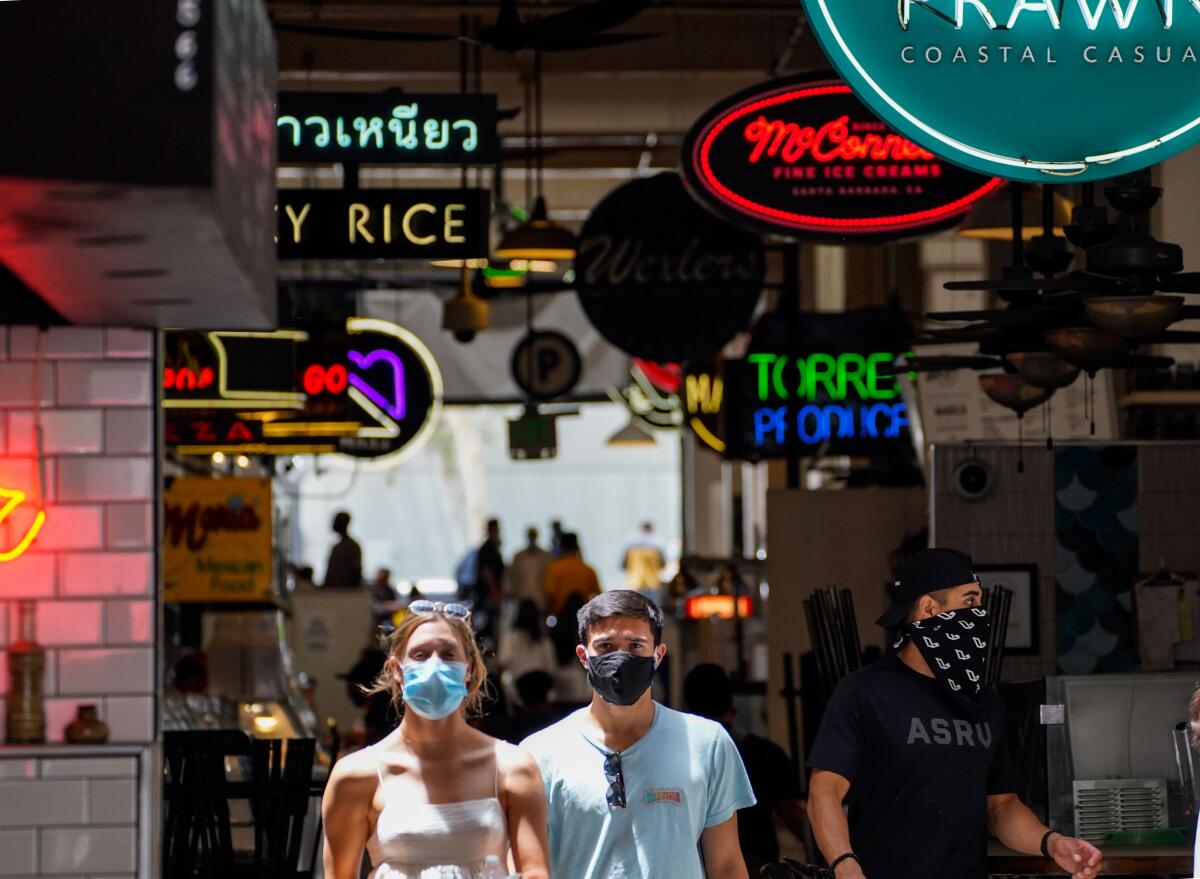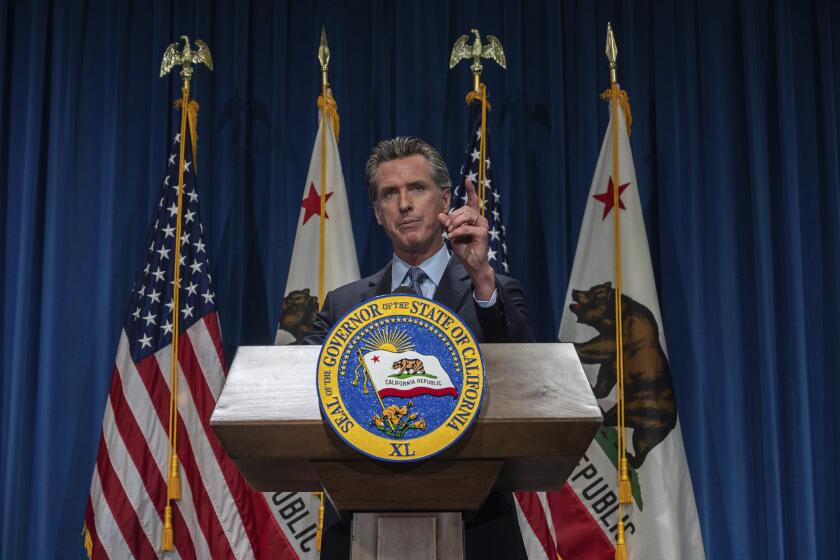New California COVID relief could include checks, business grants, child savings accounts

- Share via
SACRAMENTO — The California Legislature is weighing a raft of proposals to provide new financial help to residents who have suffered economic hardship during the COVID-19 pandemic, including rent relief, state stimulus checks and grants for small businesses and entrepreneurs wanting to start new ventures.
More than a dozen proposals were unveiled this month by Gov. Gavin Newsom as part of his California Comeback Plan, which he wants to finance with a portion of a historic tax revenue windfall as well as more than $25 billion in federal relief approved by Congress.
“This is a jumpstart for our local economies, and it’s how we’ll bring California roaring back,” Newsom said in announcing the new proposals.
Legislators began holding public hearings on new budget proposals Wednesday.
The new budget builds on previous help approved in February that is providing partial rent relief in addition to state stimulus checks of $600 largely for households with incomes of $30,000 or less.
Newsom’s latest budget plan boasts more than $100 billion in unexpected revenue that can be used to tackle some of California’s most vexing problems.
Stimulus and other direct payments
Under the new proposal, the state would provide $600 stimulus checks in the form of tax rebates for Californians who make up to $75,000 annually. Qualified families with dependents, including families living in the U.S. without legal immigration status, will be eligible for an additional $500. The plan would boost the tax rebates program by $8.1 billion to nearly $12 billion, helping two-thirds of Californians.
In addition, new grants totaling $1 billion would be made to workers who lost their jobs during the pandemic so they can go back to school or start their own businesses.
Cities and counties would receive a total of $35 million over five years to help set up universal basic income pilot programs in which low-income residents would receive a monthly check — $500 to $1,000 in some cities — with no rules on how the money is spent. The local governments would have to match the state funds. Proponents of guaranteed income programs, including those proposed in Los Angeles and Oakland, say they help poor people overcome hardships.
California Gov. Newsom’s economic recovery plan calls for $600 stimulus checks for eligible Californians. Families with children would get an additional $500.
Housing and utility relief
Newsom has proposed expanding the state’s rent relief program to pay 100% of back rent accrued during much of the pandemic as well as some months of future rent for low-income tenants as long as money is available. The state has begun paying a portion of back rent if landlords agree to waive some of the money owed.
The governor’s budget also calls for providing $2 billion to pay past-due water, electricity and gas utility bills for low-income residents.
Business assistance
Lawmakers are also considering a plan to make available state grants of up to $25,000 for thousands of additional small businesses, expanding a previously approved competitive program providing such assistance. The plan would add an additional $1.5 billion for a total of $4 billion in direct grants to California’s small businesses.
Additional federal aid would raise the total of California’s small-business grants to $4 billion, making it the largest program of its kind, Newsom says.
Also, a new California Dream Fund would use $35 million to provide micro-grants of up to $10,000 to “seed entrepreneurship and small business creation in underserved small business groups that are facing opportunity gaps,” including immigrants and Californians who speak limited English, according to the budget.
A California Competes grant program for businesses that locate or relocate to California or stay, expand and create full-time jobs in the state would grow by $250 million.
Newsom’s budget proposes $50 million for the state’s I-Bank Small Business Loan Guarantee Program to continue to provide loans as businesses recover from the economic impacts of COVID-19.
The state would also boost the State Small Business Credit Initiative, which was created in 2010, to strengthen state programs that support the financing of small businesses. California is estimated to receive $895 million from the federal government for the program.
Student aid
The governor proposes providing $2 billion to create a California Child Savings Accounts program for 3.8 million children from low-income families. Each child would receive $500 in an account that would grow over time to help them afford college.
Newsom also wants to add $4 billion over two years to develop more student housing to help reduce the cost of attending college.
And the budget would create a $1-billion program through the California Student Aid Commission for the state’s public colleges and universities to provide grants to workers who lost jobs so they can develop new skills to reenter the job market.
Other financial assistance
Newsom has proposed providing $1 billion to expand Medi-Cal coverage to adults aged 60 years and older who are living in the U.S. illegally, beginning in May 2022.
Newsom proposes $859-million expansion of Medi-Cal to cover seniors regardless of immigration status, funded by a massive rise in income tax revenue.
He is also asking the Legislature to allocate an extra $30 million for the state’s Film and Television Tax Credit Program, which provides tax credits for eligible films produced in California.
In addition, the budget proposes $7 billion to expand broadband infrastructure and enhance access for Californians.
More to Read
Sign up for Essential California
The most important California stories and recommendations in your inbox every morning.
You may occasionally receive promotional content from the Los Angeles Times.















